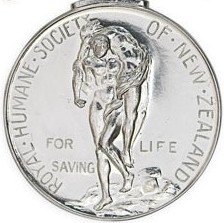Royal Humane Society of New Zealand awards

May I begin by greeting everyone in the languages of the realm of New Zealand, in English, Māori, Cook Island Māori, Niuean, Tokelauan and New Zealand Sign Language. Greetings, Kia Ora, Kia Orana, Fakalofa Lahi Atu, Taloha Ni and as it is the afternoon (Sign)
May I specifically greet you: Your Honour Judge Neil Hattaway, President of the Royal Humane Society of New Zealand; Award recipients and your friends and families; Superintendent Bill Searle, Commander of the Waitematā Police District and fellow Police colleagues; Distinguished Guests otherwise; Ladies and Gentlemen.
My wife Susan and I welcome you all to Government House in Auckland for this presentation of seven Royal Humane Society of New Zealand Medals.
Before I present these medals as Patron of the Society, I would like to speak of the significance of the awards being made today.
The Royal Humane Society of New Zealand was established 111 years ago in 1898, having antecedents in the Royal Humane Society, established in 1774 in England and the Royal Humane Society of Australasia established a century later in 1874.
The role of the Society today, as then, is to recognise those who have saved, or attempted to save, the lives of others at the risk, and sometimes the cost, of their own lives.
While significant awards existed to recognise those in the military who had committed acts of bravery and valour, until the establishment of the Society, there was little to recognise civilians who had risked their lives in peacetime. As the English poet John Milton once said: Peace hath her victories, no less renowned than war.
While civilian bravery awards were later established by the New Zealand Government as a part of the Honours system, the Royal Humane Society of New Zealand's awards continue to be officially recognised.
Along with those honours made by the Order of St John, they are the only non-government honours that can be worn as well as royal honours. Throughout its history the Society has bestowed more than 2000 awards, including 211 silver awards and 694 bronze awards.
Ceremonies such as this are often bitter-sweet affairs. One only has to glance through the Society's centenary publication, Zealandia's Brave, to see many instances where either the person being rescued has died despite the best efforts of those attempting to save them, or equally sadly, where one of the rescuers has paid the ultimate sacrifice.
The six silver and one bronze medal being awarded this afternoon represent courageous bravery displayed in rescuing others whose lives were in peril.
In the first incident on 30 January 2006, Donna Kitchener swam out and saved a boy caught in the Manukau Harbour mudflats at Green Bay as the tide was rising. The boy's father, who also went to his son's aid, tragically died in the rescue attempt.
In the second incident Anthony Church and Joseph Harding saved the driver of a fuel tanker involved in a collision with a truck on State Highway 1 near Hamilton on 30 October 2007. Soon after the rescue the tanker was engulfed in flames. In the same incident, Albert Collins rescued the driver of the truck.
In the third incident on 8 June 2008, Joe Nunufolau, John Tavita and Shane Robinson saved four people trapped in a van which was on fire after a collision with a car on State Highway 22 at Karaka near Papakura. Soon after the rescue, the van was engulfed in flames. I am advised that the Society has separately presented to Karl Hogan, who lives overseas, a silver medal for his role in this rescue.
The bravery and courage you have all displayed was of an extremely high calibre. You placed your own lives at risk to come to the aid of others. They were people with whom your only connection was the common bond of humanity.
Courage, in all its forms, is not a common virtue. No doubt you will humbly say that you did what anyone would have done. But no-one knows exactly what they would have done in the same circumstances.
As Governor-General, I also present the New Zealand Honours for bravery and valour. They have included awarding New Zealand's highest honour, the Victoria Cross for New Zealand, on Corporal Willie Apiata, of the New Zealand SAS, for courage shown in Afghanistan. Others to receive awards have included members of the New Zealand Police and civilians to have come to the aid of neighbours and strangers alike.
Many of these people have remarked that either they were just "doing their job" or that it was something that "anyone would have done." Daily experience tells us, however, that such courage is not common and yet it is so important. The British Prime Minister of more than 50 years ago, Winston Churchill, once said: "Courage is the first of human qualities because it is the quality which guarantees all others."
You have all displayed that greatest of human qualities. It is, for me, a great privilege as Patron of the Royal Humane Society of New Zealand to confer these medals on you today.
On this note, I will close in New Zealand's first language, Māori, offering everyone greetings and wishing you all good health and fortitude in your endeavours. No reira, tēnā koutou, tēnā koutou, kia ora, kia kaha, tēnā koutou katoa.
To view images from the ceremony, click here.
Visit the Royal Humane Society of New Zealand website.
